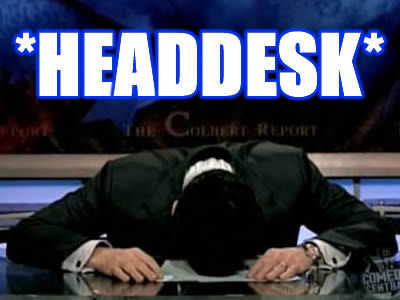I mean, seriously — how many times do I have to do this? Forever? Is it forever? Just let me know if it’s forever, so I can change a few plans.
Let’s get right to it: a blog post by Tod Robberson about Mike Miles that sets up a straw man to knock over.
Okay, here’s the column, if you’re looking for a reason to headdesk yourself today. But if not, all you really need are the first three graphs:
There’s always been a pall of illogic surrounding Dallas ISD Superintendent Mike Miles’ assertion that teachers are largely expendable after five years of service because, he has said, they’ve reached their maximum level of effectiveness and cannot be expected to improve significantly beyond that point. He has used this assumption, which administrators around the country seem to have bought into, to nudge experienced teachers toward the exit door so the district can hire younger, cheaper and more malleable teachers who are less likely to challenge his reforms.
New studies cited this week by Education Week suggest that the five-year “plateau” effect for teachers is bogus.
The assertion by Miles, which he made during his first year on the job and prompted a whirlwind of controversy, is illogical because it runs contrary to the practices of just about every other profession out there. Experience matters. It is highly valued. Major corporations do not, as a rule, hire top executives with only five years on the job under the assumption that, well, after five years they’ve peaked and probably aren’t worth holding onto any more. It’s nonsensical on the face of it.
It’s totally understandable if you read that and think, “Wow, Miles sounds so stupid. Of course experience matters!” Because to think teachers can’t get better after five years, and to use this line of thinking to get rid of experienced teachers, would be incredibly stupid.
The problems:
• Miles doesn’t believe this today.
• Miles has never said he believes anything like this except (taking Robberson’s word for it, which I have no reason to doubt) in one editorial meeting three years ago.
The Miles Doesn’t Believe This Problem:
I’ve never heard Miles say what Robberson suggests, in public or private conversations. (I think I’ve talked to Miles twice in casual off the record situations about TEI and its effect on experienced teachers.) I’ve listened to almost every public comment Miles has made to the school board about education policy during the past year. But to be sure, I called three school board members to see if they’ve ever heard him say this. Nope. So then I asked to talk to Miles.
“It’s a straw man, Eric,” he told me Friday. “Of course I don’t believe that. It’s absurd.” Miles went on to explain what he does believe: that teachers LEARN THE MOST during their first few years. Which makes sense. “I mean, my first two years, I was LOST,” Miles says. So, his point is how important it is to get good training and support systems for first- and second-year teachers. And then after five years, you need a different type of support system and teacher training in place to help “progressing” (my word: stagnated) teachers reach their full potential, help good teachers become great, and encourage great teachers to take on the biggest challenges (teaching the poorest, neediest kids) and/or become administrators.
It’s very simple to prove he doesn’t believe this: His teacher evaluation system, TEI — which Robberson characterizes as designed to screw over experienced teachers — doesn’t even allow for a teacher to score its highest level (“Proficient”) until that teacher has at least three years’ experience. So Robberson wants us to believe that Miles’ plan is to get in young cheap teachers, train them for three years until they’re excellent, then get rid of them two years later? Like Miles said, absurd.
The Miles Apparently Said This Once Problem:
Now, did Robberson and Miles go at it in a meeting three years ago? Sure. Did Miles say stuff that Robberson interpreted as asinine? Apparently. But I suspect that what Miles was saying in citing the studies Robberson mentions is more nuanced than what Robberson wrote. Perhaps Miles put weight in those studies, and said studies haven’t held up well. Fine. Point that out. But to extrapolate and suggest Miles doesn’t value experience is just not fair. My guess: Robberson heard what he wanted to hear, which echoed fears from other DISD teachers and the teachers’ unions. (His wife is a teacher.) And even if I’m wrong about that — I may very well be, I wasn’t at this meeting — Miles clearly hasn’t said this since and doesn’t believe it today.
We can ignore that I’m pretty sure TEI data is going to show a correlation between experience and excellence. (So much for a system designed to push out experienced teachers.) We can ignore that Robberson’s characterization of TFA teachers doesn’t at all align with reality. (I’ve talked to about 20 TFA teachers; they’re all young, naive, smart, and you’d be lucky to have any of them as a teacher for your kid — ESPECIALLY for your at-risk very poor kid, given their passion.) But let’s not ignore that Robberson argues the following: Anyone can learn and grow on a job BUT we should all assume that a position Mike Miles supposedly held three years ago can’t evolve. Sorry, that doesn’t make sense.





